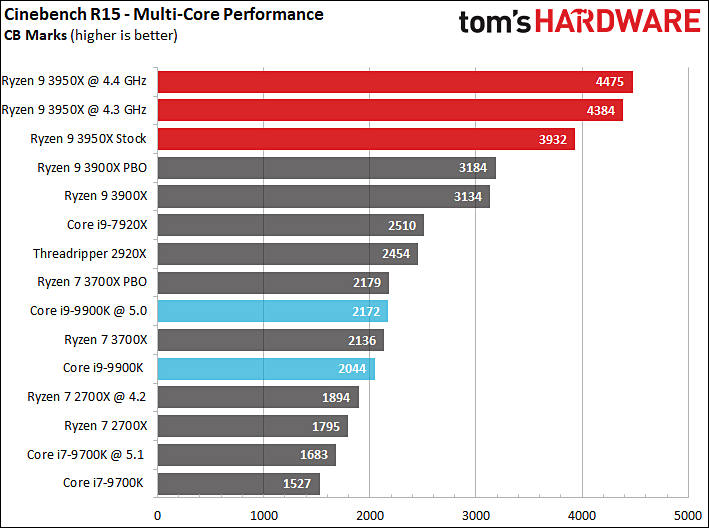
It allows to keep PV going, with more focus towards AI, but keeping be one of the few truly independent places.
-
I managed to snag one of the 3950X on launch day and replaced my previous 2700X. Something I was not expecting to find in upgrading was that my GTX1080 cannot keep up with it on 4K BRAW timeline render to H264 in Resolve with mild grading. During a render it fully loads around 20-24 CPU threads with the GPU bouncing off 100% load throughout. It's still nice to have the system be fully responsive and able to multi task during the render but that seems to be the limiting factor on my render speed now.
I'm running it on an Arctic Liquid Freezer II 240 AIO and it is very nice to have replaced the jet engine that used to sit beside me ramping up and down all day long (Wraith Prism).
-
Boost frequency of the Zen 2 processors is very dependent on temperature.
AMD calculated their rated boost clocks at 50°C die temperature.
Depending on the processor, maximum boost will go down with temperature:
- 3900/3950 - 75 MHz per 10°C
- 3800/3700 - 50 MHz per 10°C
- 3600/3500 - 35 MHz per 10°C
-
Looking at reviews you see very hard hand of AMD, as maximally pushed are benchmarks and apps that do not require much memory performance and instead require maximal load on floating point operations, but preferably without much AVX2 (as CPU drops speed like mad in this mode).
Of course, AMD also recommended that memory to use - preferable DDR4 3600 CL14 or better set (can be from 50 to 250% more than price of usual 3200 CL16 set).
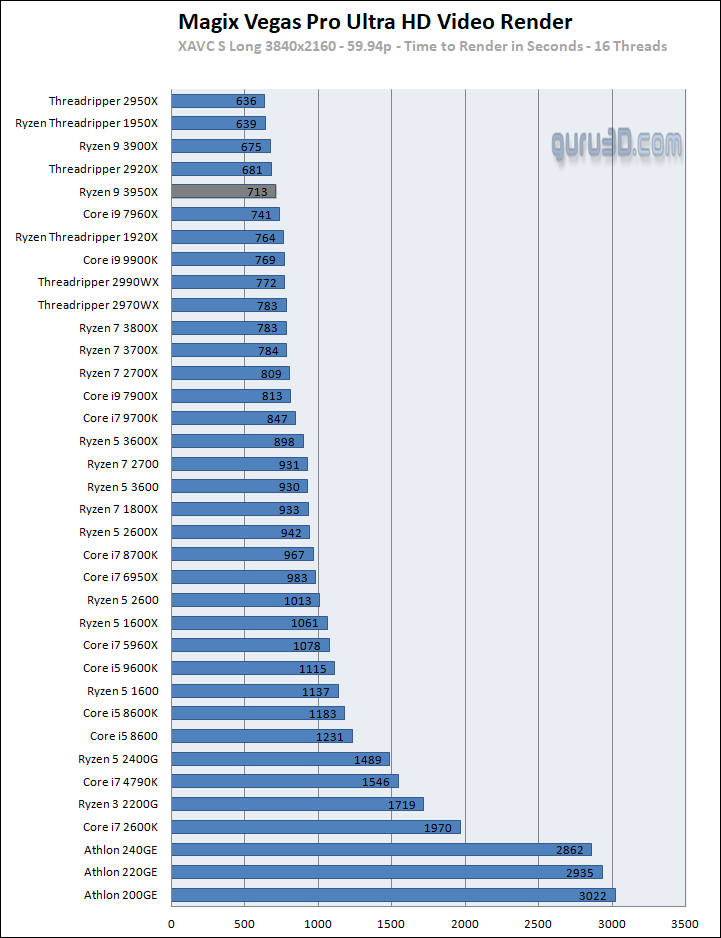
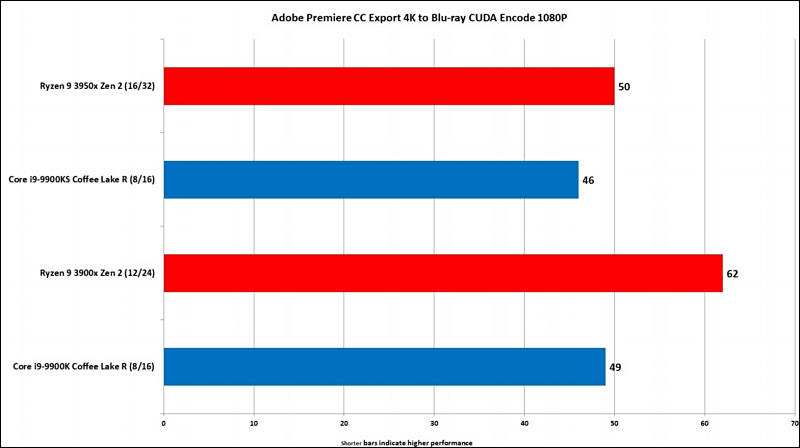

 sa11003.jpg721 x 938 - 116K
sa11003.jpg721 x 938 - 116K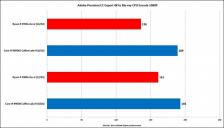
 sa11001.jpg800 x 457 - 33K
sa11001.jpg800 x 457 - 33K
 sa11002.jpg800 x 448 - 37K
sa11002.jpg800 x 448 - 37K -
3950X frequency drop
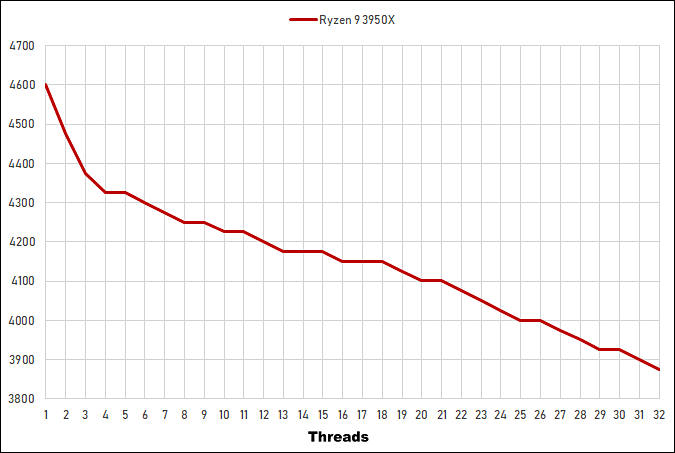
Actual energy efficiency not much better than 12nm Threadripper in Cinebench
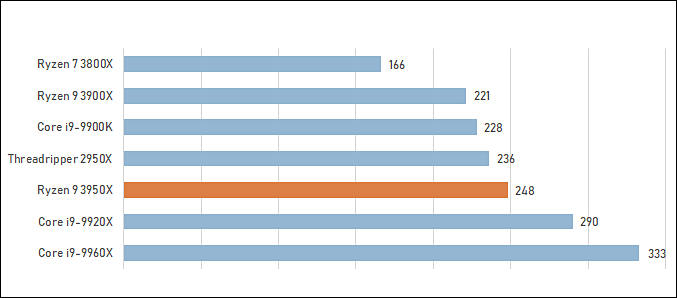
As predicted Premiere is improving fast in handling multithreaded processors with >8 cores
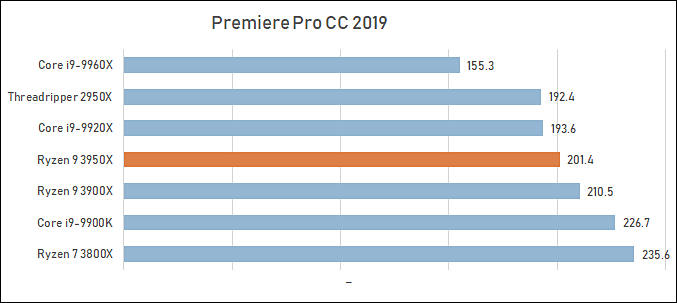
Encoding is better mostly because of additional FPU units
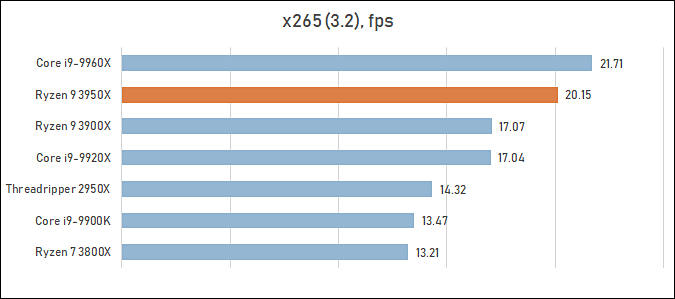

 sa10993.jpg675 x 453 - 47K
sa10993.jpg675 x 453 - 47K
 sa10996.jpg677 x 298 - 30K
sa10996.jpg677 x 298 - 30K
 sa10994.jpg677 x 303 - 33K
sa10994.jpg677 x 303 - 33K
 sa10995.jpg675 x 299 - 32K
sa10995.jpg675 x 299 - 32K -
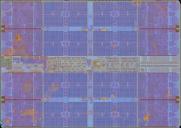
 sa10953.jpg800 x 567 - 93K
sa10953.jpg800 x 567 - 93K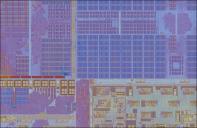
 sa10954.jpg800 x 520 - 95K
sa10954.jpg800 x 520 - 95K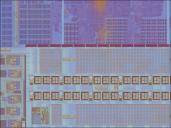
 sa10955.jpg800 x 598 - 105K
sa10955.jpg800 x 598 - 105K -
On different way to cool this CPUs
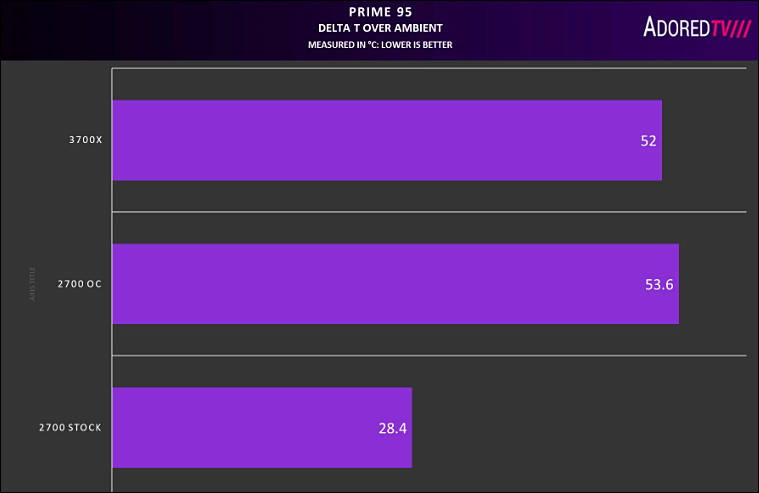
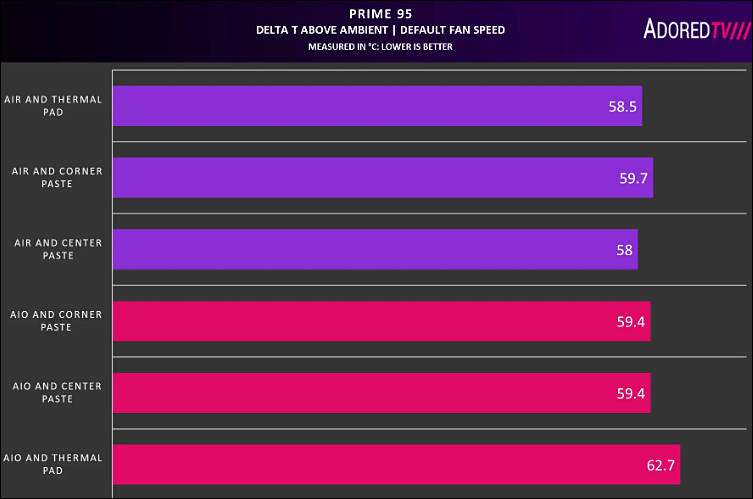
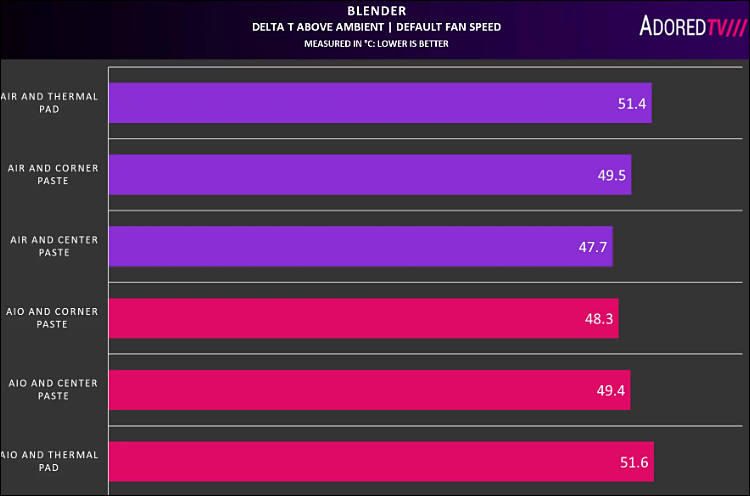
https://adoredtv.com/ryzen-3000-thermal-analysis-what-can-cool-a-3700x-the-best-and-why/

 sa10784.jpg759 x 493 - 30K
sa10784.jpg759 x 493 - 30K
 sa10786.jpg750 x 496 - 44K
sa10786.jpg750 x 496 - 44K
 sa10785.jpg753 x 499 - 45K
sa10785.jpg753 x 499 - 45K -
AMD Ryzen developer and author of DRAM Calculator for Ryzen, has revealed a new power plan that nets an average increase of 200-250MHz on AMD Ryzen 3000 series processors.
According to the developer, the mod will work on all Zen 2 based processors including the upcoming Threadripper series.
https://www.techpowerup.com/review/1usmus-custom-power-plan-for-ryzen-3000-zen-2-processors/2.html
-
First deals
- Ryzen 3600X for $244 - https://www.newegg.com/amd-ryzen-5-3600x/p/N82E16819113568
- ASRock X570 PRO4 AM4 for $129 - https://www.newegg.com/p/N82E16813157886
-
AMD started slow marketing preparation to 16 core release
Special leaks show that Ryzen 9 3950X is only 10% faster compared to Ryzen Threadripper 2950X in Geekbench 5.
In real app with good memory load difference will be around 2-3%.
-
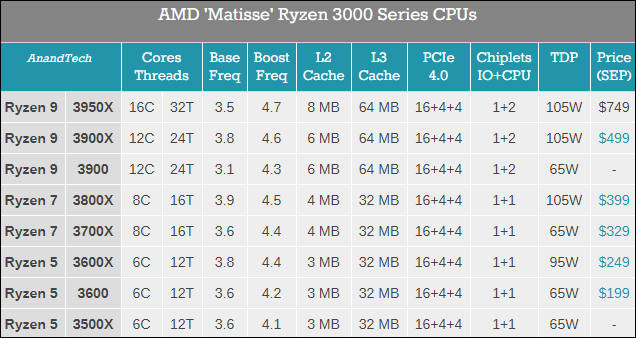
To keep margins high on existing CPUs, AMD decided not to sell 3900 and 3500X to end customers.
AMD also will restrict 3500X to select Chinese manufacturers only and will track it carefully to prevent any leaks of cheap CPU on the global markets.
AMD behavior considering Ryzen 3000 series is much worse than any Intel behavior and profits levels are unmatched (if you take into account EPYC prices they triple previous industry record, as EPYC level profits exist only in the illegal drugs and big pharma areas!).

 sa10349.jpg636 x 338 - 61K
sa10349.jpg636 x 338 - 61K -
Yep.
The question of longevity of the solution is something that piqued our interest but the bigger problem for AMD right now is to manufacture enough of the 7nm chipset pieces.
I think company try to delay big publicity on this until late 2020.
Actually main marketing of new Zen 3 can be that it is more stable and can live longer. Plus 4 threads SMT.
IPC won't increase much as I heard.
-
Yes I'm aware of the electronic degradation on more small and small circuitry as of today, already they are starting to mass produce "5nm", but selling 500 to 700dll CPU that will start to slowly loose performance by the 4th year or maybe even fail. That's a serious issue.
I've read that at stock settings (no overclock) the processor is smart enough and will protect itself from risky voltages, lowering itself, and even shutting down if temps are high enough. I also read that latest bios have higher clocks but lower voltages and also some performance lost, maybe because of this safety measures, and in the way some damage control to avoid huge lawsuits because false advertising on clock speeds.
Please keep us informed about this I will also comment if something on interest is found.
-
It first leaked as AMD reduced actual boost frequency with new BIOS releases.
After big public noise they returned most of the initial boost, but reason of their initial behavior can be only the fast degradation of chiplets.Note that 7nm transistor is close to practical limits for such structure (and is not 7nm :-) ), also as you boost voltage and work on high temperatures such small elements degrade much faster and have much more internal leakage. It is good reason why Intel couldn't match 32nm Sandy Bridge overclocking frequency until the last 14nm generation, as 14nm leaks are much higher. If companies made 32nm chiplets using all the improvements used in last processes we had 5.1-5.2Ghz chips.
In reality 22nm-32nm are ideal for high performance CPUs where you can use water cooling, but you need smaller processes if you want big cache memory. So, ideal is the mixed process, where half of chiplet is being made using 22-32nm and half is made using high density 5-7nm and it is area where SRAM memory and some IO can reside.
-
WOW that's a big assumption, how can this be proven? I´m thinking on getting an AMD system for the end of the year maybe beginning next year, but a life expectancy of 2-4 years changes the decision quite radically, it makes little sense on investing big money on something for 7 to 10 years of use, and better to spend just for the price/performance/ minimum usability required. Please spare some more information when available.
-
Not only AMD can't keep doing 3950X on time. But they also can't supply enough 3900X even.
Also note that it is till rumors of internal talks in AMD about fast degradation of 7nm chiplets. CPU life for current 7nm process can be limited by 2-4 years until significant max frequency drop.
-
Usual 3900 coming, with 65w bullshit TDP (real stock is around 120W)

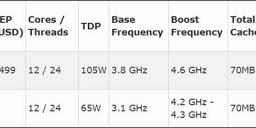
 sa10213.jpg800 x 240 - 37K
sa10213.jpg800 x 240 - 37K -
16 core model postponed
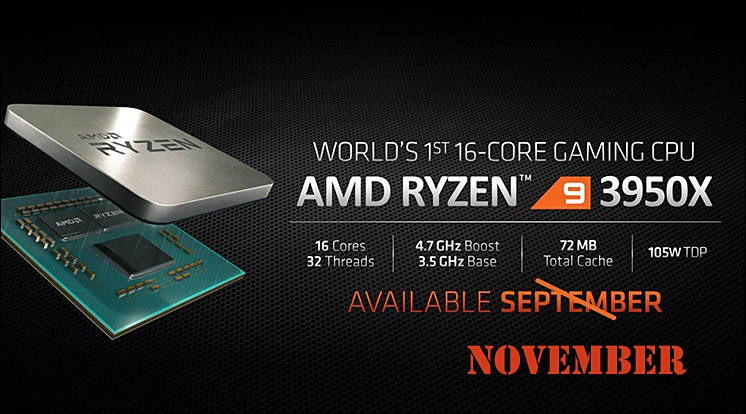
Actual 7nm yields are still bad, it seems, with lot of defects and very rare all 8 cores on chiplet can work.

 sa10127.jpg746 x 414 - 58K
sa10127.jpg746 x 414 - 58K -
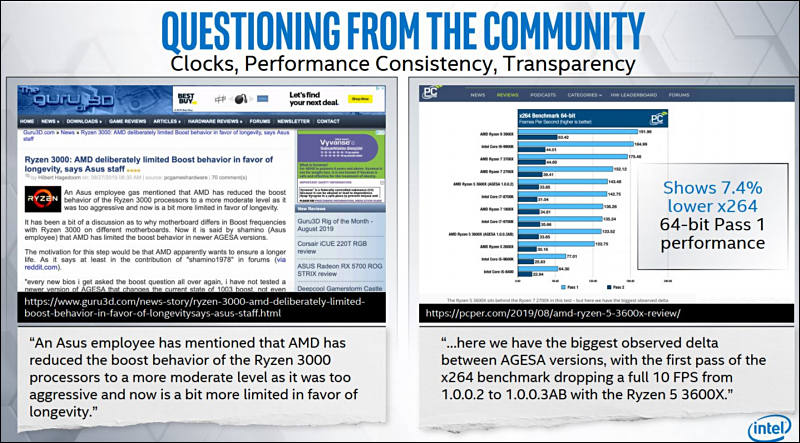
The original limits for Ryzen 3000 SKUs were:
- 3600 = 4100MHz (80-95°C) / 4200MHz (< 80°C)
- 3600X = 4200MHz (80-95°C) / 4400MHz (< 80°C)
- 3700X = 4200MHz (80-95°C) / 4400MHz (< 80°C)
- 3800X = 4300MHz (80-95°C) / 4550MHz (< 80°C)
- 3900X = 4400MHz (80-95°C) / 4650MHz (< 80°C)
Since then, it appears that the HighTemperature limit has been reduced further to 75°C (from 80°C). New SMUs also have introduced "MiddleTemperature" limit, but that gets disabled when PBO is enabled.
There's no doubt that the 'reviewer BIOS' is faster and sustains higher boost clocks for longer than the latest releases. Many chips aren't reaching their full boost potential even with the N11 'reviewer BIOS,' so AMD's fix might consist of returning to the original hard 80C boost temperature limit, which we're told hasn't been officially seen in the wild.

 sa9969.jpg800 x 443 - 100K
sa9969.jpg800 x 443 - 100K -
Marketing started to strike back
AMD is pleased with the strong momentum of 3rd Gen AMD Ryzen™ processors in the PC enthusiast and gaming communities. We closely monitor community feedback on our products and understand that some 3rd gen AMD Ryzen users are reporting boost clock speeds below the expected processor boost frequency. While processor boost frequency is dependent on many variables, including workload, system design, and cooling solution, we have closely reviewed the feedback from our customers and have identified an issue in our firmware that reduces boost frequency in some situations. We are in the process of preparing a BIOS update for our motherboard partners that addresses that issue and includes additional boost performance optimizations. We will provide an update on September 10 to the community regarding the availability of the BIOS.
-
Boost statistics for single core
-
Ryzen 3000 memory system
-
Ryzen 5 3500 coming soon
- Disabled HT, so 6 cores / 6 threads, purely marketing requirement to segment offers
- 3.6 GHz base clock
- 4.1 GHz max boost
- chiplets with worst binning
- 65W TDP (it is lie, of course)
- cost to manufacture of such complete CPU to AMD is around $20-25 :-)
Howdy, Stranger!
It looks like you're new here. If you want to get involved, click one of these buttons!
Categories
- Topics List23,990
- Blog5,725
- General and News1,353
- Hacks and Patches1,153
- ↳ Top Settings33
- ↳ Beginners256
- ↳ Archives402
- ↳ Hacks News and Development56
- Cameras2,367
- ↳ Panasonic995
- ↳ Canon118
- ↳ Sony156
- ↳ Nikon96
- ↳ Pentax and Samsung70
- ↳ Olympus and Fujifilm101
- ↳ Compacts and Camcorders300
- ↳ Smartphones for video97
- ↳ Pro Video Cameras191
- ↳ BlackMagic and other raw cameras116
- Skill1,960
- ↳ Business and distribution66
- ↳ Preparation, scripts and legal38
- ↳ Art149
- ↳ Import, Convert, Exporting291
- ↳ Editors191
- ↳ Effects and stunts115
- ↳ Color grading197
- ↳ Sound and Music280
- ↳ Lighting96
- ↳ Software and storage tips266
- Gear5,420
- ↳ Filters, Adapters, Matte boxes344
- ↳ Lenses1,582
- ↳ Follow focus and gears93
- ↳ Sound499
- ↳ Lighting gear314
- ↳ Camera movement230
- ↳ Gimbals and copters302
- ↳ Rigs and related stuff273
- ↳ Power solutions83
- ↳ Monitors and viewfinders340
- ↳ Tripods and fluid heads139
- ↳ Storage286
- ↳ Computers and studio gear560
- ↳ VR and 3D248
- Showcase1,859
- Marketplace2,834
- Offtopic1,319





